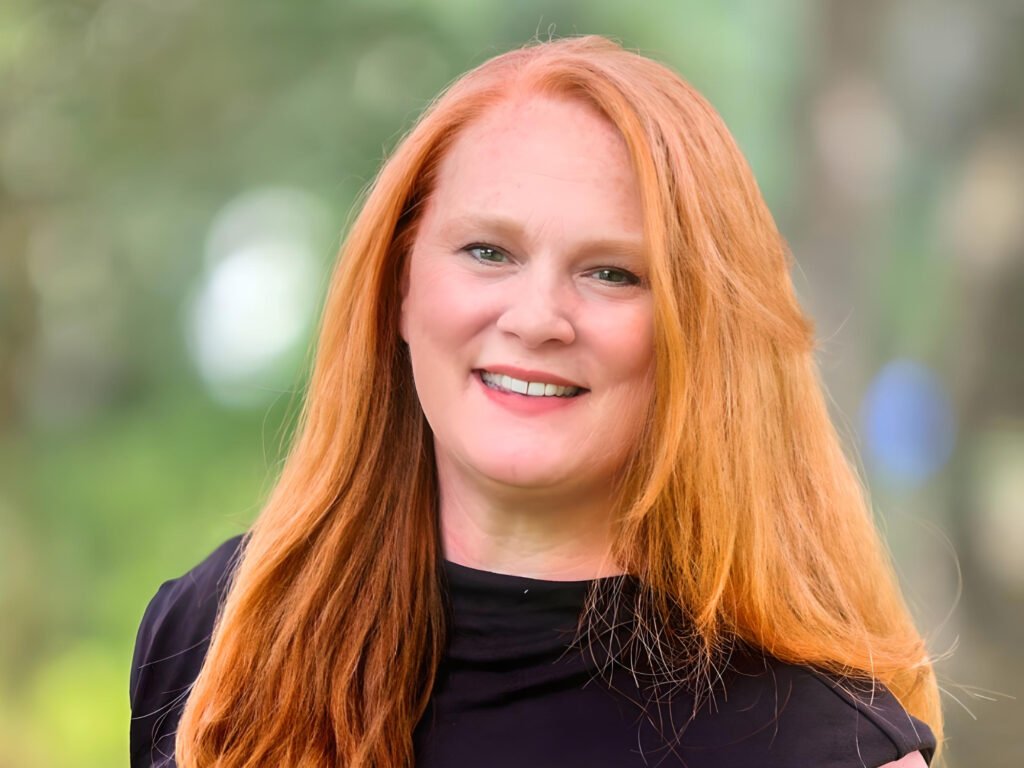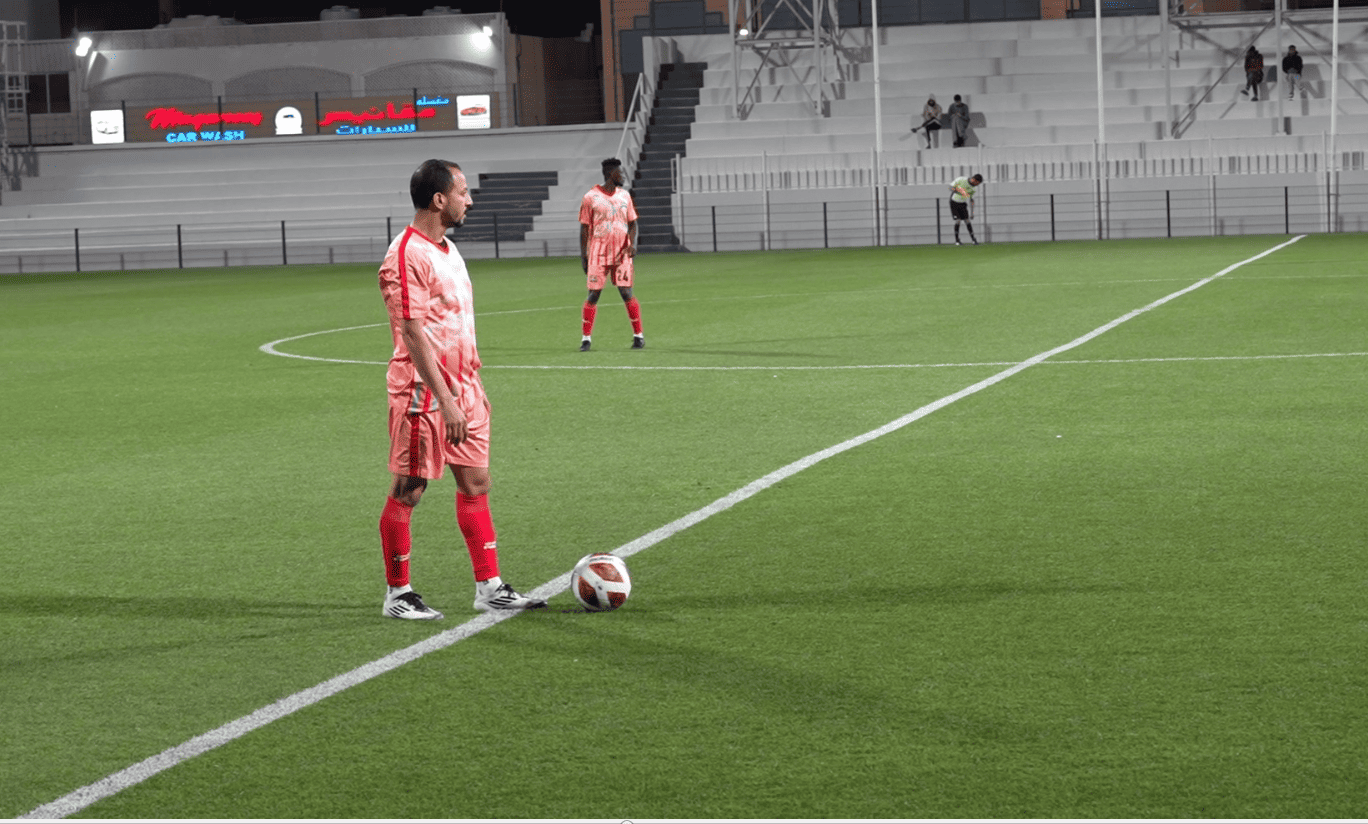(ATLANTA) — When Tia Levings saw a fleeting opportunity for escape, she took it. It was a cold night in late 2007. Her husband’s violence had peaked. Wisps of smoke from her fireplace clawed at her nostrils as she snatched her four children, hopped into her forest green 2000 Dodge Caravan, and bolted. With blood in her mouth from biting her cheek, she sped away, shaking. Her remote mountain community of less than a thousand people, 45 miles west of Knoxville, Tennessee, faded into the background.
“I just knew I had to get away,” she says. For her, the instinct to leave home was primal.
Almost 17 years later, as a full-time writer, Levings lives a strictly regulated life, though now the rules are on her terms: No meetings on Mondays. Tuesdays are for talking. Wednesdays are for intense work-related writing. Thursdays are backup for missed Zoom calls from Tuesday. Fridays are for leisure writing. Saturdays vary, but Sundays are “absolutely sacred self-care days.”
On a Tuesday in January, we meet on Zoom. The pixelated blur resolves into a woman with golden-red hair, stark against the sterile white wall. She sits still and attentive, with harsh light from a window radiating behind her. In the background, a faint dark shape on the table hints at a small coffee maker, the only adornment in this space. She stares forward like she’s playing poker, a subtle crease above her brows, the only detail hinting at her thoughts. She looks at home against the almost clinical whiteness. The scene is a study in contrasts — a woman full of color in a room devoid of it.
Levings is calm but speaks like a blade of grass —sharp when slicing but relaxed when resting. She responds to questions quickly as if on a game show, with no filler and deliberate word choices. “We were on TV,” was her response to my request to describe her childhood church. “So to grow up in a place where it felt like we had all of the privileges, that it was a direct blessing from God, was normal for us.”
Her memoir, “A Well-Trained Wife: My Escape from Christian Patriarchy,” out this August, challenges sanitized descriptions of extreme religious beliefs and shows how abusive environments persist under the guise of protecting religious rights. She’s releasing this book on the tails of the 2023 docu-series “Shiny Happy People: Duggar Family Secrets,” released last June on Amazon Prime Video.
The series exposes the reality TV star Duggars’ ties to the Institute in Basic Life Principles (IBLP). This Christian ministry works alongside churches but isn’t part of any particular church. Bill Gothard, a once-influential minister, founded IBLP as a homeschooling program and ministry promoting strict patriarchy and “family values.” Ensnared in a marriage built on Gothard’s tenets of male authority ruling supreme, Levings paints a vivid tableau of the violent horrors lurking within Christian fundamentalism.
Levings, 49, was raised attending First Baptist-Jacksonville, a 20,000-member Florida mega-church that now touts itself as “a place for you and your family to grow in your faith.” Surrounded by white men who preached a gospel of silence for all women, she would often get in extra trouble for being argumentative or merely talkative. The men who claimed authority over her at the church shamed all tomboyishness. She says she was taught to prepare for marriage and family and, unless she became more submissive, that would never happen.
Over time, the church used subtle rebukes and eye-rolls to train her naturally husky voice to sound like baby talk. She says that soft-spoken tone made her feel incredibly small despite being taller than the other kids. These days, you can hear her true voice has returned. “We were just constantly groomed to this one way of living,” she says. “We were the right way and everyone else was wrong.”
In what she calls a world “isolated in plain sight,” she remembers church family members passing around a book titled, “To Train Up a Child,” by Christian couple Michael and Debi Pearl. Many Christians were taught that the “tough love” principles touted by the Pearls were psychologically sound. The book contains quotes like: “A proper spanking leaves children without breath to complain,” and “If, during the course of a day, no contest arises naturally, you should arrange one. Seek opportunity to thwart the child’s will, to cause him to submit to your command.”
Such rhetoric illustrates that Levings’ abuse wasn’t isolated attacks by one person. Her trauma is one of millions of examples of male-made machines allowing fathers and husbands to rule families like tyrants. She doesn’t dwell on the escape itself — that’s in the past.
Raised in Fear
From childhood, she was told that adults hitting children was holy.
Jokes, sermons, and encouragement to beat the “stubbornness” out of children normalized physical discipline. This harshness extended beyond children, with what she calls the “known secret” of wife-spanking within fundamentalist Christianity.
Everyone she grew up with would instill fear of the “rapture,” this idea that Jesus would suddenly return and take only real Christians to heaven, and you’d be left behind if you didn’t believe in him with your entire being. This fear rested on top of the normal kid stuff like feeling awkward or uncool. Even summer camps turned into intense experiences where counselors would yell at children and try to provoke tears as a sign they were scared of hell. Levings was a curious kid who liked to question things and share her ideas. But in this world, they called her “intimidating” just for speaking out. Further, she looked different with her red hair and paler skin than most who live near Florida beaches. She was an outsider.
Levings wanted to fit in and have a normal life with a husband and family someday, but that meant hiding her true self. She learned to be quieter and act more like everyone else expected. She toned herself down. That’s how she found herself in a world where brutality masqueraded as discipline — physically abused while engaged to a fundamentalist. Immediately after graduating high school, she got married and then was pregnant.
She was taught that spanking was necessary to maintain a healthy family structure. Male pastors and church leaders would use biblical imagery of shepherds guiding and protecting sheep with strikes from rods.
Virtually all credible research in recent years shows that spanking alters children’s brain activity negatively. The findings suggest that spanking leads to worse memory, a lack of self-control, anxiety, depression, and academic challenges. This contradicts what Levings was taught. She was told, “Spare the rod, spoil the child.” Even so, she knew that the physical abuse that was commonplace in her family couldn’t be normal. It took her more than a decade to gather the courage to explain to a counselor at her church the violence in her home. Expecting support, she was met with disappointment.
She remembers sitting in his office at the church’s counseling center, which was located on the ground floor of their new building designed for childcare. Wearing a business suit, with a line of evangelical books behind him, the counselor calmly folded his hands and admonished her, saying, ‘You need to honor your husband more.’
Levings is focused on unmasking how these religious structures are quietly creeping into every corner of our lives, from government to pop culture. It’s not sensational for her, it’s a single, powerful image in a larger fight against blind obedience and violence. “I believe that what happened to me in private is what’s coming for our country,” she says. She sees the specter of a totalitarian Christian authority gnawing at the fabric of society.
For example, Speaker of the House Mike Johnson, a staunch Christian fundamentalist, has brazenly admitted that he wants to form government policy around Christian principles — which for him is anti-gay, anti-abortion, and frankly, anti-women. Levings perceives this not merely as a Republican aberration but as another mutation of fundamentalist rhetoric having political consequences.
“The evangelical voting base did choose that president,” she wrote in 2020. “Donald Trump is a reflection, product, and example of the white, straight male, evangelical base. To see one is to see the other.”
“Tia has always had a very poetic way of speaking,” says Lisa Cooper Ellison, a trauma-informed memoir coach who helped Levings with her book in 2020. “She can immerse you in a scene that brings you to [the] place. I think for survivors that makes them feel very known. because they can see that she’s not just talking about this experience, she has truly been there.”
“I’ll never get back the years that I lost,” Levings says, “but what I do have is an opportunity to take it back.” Telling her story is personal therapy, but she also sees it as a public service. “I made something beautiful out of something so painful,” she says. “I decided instead of making [my past] eat me up with bitterness and sadness that I would do something that would help.”
She admits she once was complicit in many toxic ideologies she is now outspoken against. But even in childhood, there was always a flicker of dissent. “She knew who I was before I knew who I was,” says Levings’ lifelong friend Michael Peterson. Four months her junior, Peterson met Levings after he followed a boy he had a crush on to the mega-church they attended. He often felt lost, as a closeted gay kid during the Reagan administration, but he says Levings made him feel found.
“She was always there,” Peterson says. In high school, he dated a girl close to Levings, despite being gay, just to hang out with Levings more.
When Levings got married shortly after their graduation, Peterson saw it as a red flag, but he wanted to support her. When he eventually told her he was gay, she was not surprised. But neither was her husband. “He had already seen through me,” Peterson says. Levings’ husband’s Christian authority felt threatened by any hint of association with a gay man — which Peterson says her husband found ‘disgusting.’ In 2007, Peterson got married in Massachusetts. Although he invited Levings to the wedding, he sensed she might not attend, even without knowing the full extent of the ongoing abuse.
Months later, amidst feeling “held hostage” in her secluded Tennessee home, Levings escaped. She withholds details, saving them for her book. But in the years that followed she wandered as a nomad searching for sanctuary, a fugitive fleeing a haunted past. She’s safe now and provides stability for others.
Slow and Steady
Levings’ second divorce was a lot less dramatic than the first. “Husband 2.0 did not want to be married to a writer,” she says. She did not waste time and “dismissed” him without any help from attorneys.
She prioritizes her goals as an author, wanting to surround herself with people who support her aspirations. But she still took the time to grieve, on a trip to Europe last year. “I build a life that resists urgency,” she says. “So what you’re seeing publicly is not true privately. I guard my slowness.” This isn’t idealized therapy talk. Levings won’t travel by plane but will often take trains. She even took a boat to travel abroad. “Shiny Happy People” premiered on Amazon Prime as she arrived in Southampton. Feeling nervous about watching, she dialed a friend on the phone for support and they watched it together, virtually.
The theme of “slowness” in both her writing process and personal journey is curious. It took a decade for her to speak up about her abuse, several more years to start writing her book, and yet another decade to finally get it published. While she projects being bold and fiercely protective, it seems only out of necessity in the face of the insidious intersections of abuse. “Shiny Happy People” opened the door for her story to be told while remaining steadfast in her belief that faith is a fluid, private journey. She’s a writer and she talks like one.
Towards the end of our time together I ask what questions she wishes people would ask her more. She smiles and giggles, ”What I’m reading!”
“What are you reading?” I ask.
“I’m reading ‘Holly’ by Stephen King,” she replies, pulling the book off her desk and clinging to it tightly with both hands.
I continue, “So is horror one of your favorites?”
“I’m not afraid of it,” her smile gone, “I’ve already lived horror.”
The paradox even bigger than a colorful woman, both in word choice and hair, talking to me from a square on my screen with a background that looked as bland as a hospital room, is that someone so visibly panicked that our country is turning into “The Handmaid’s Tale” wants to fight like a tortoise instead of a hare.
“I think the most important thing that any writer can have is a door to close,” Levings says. She needs solitude, hard copies of any book she references, a Blackwing pencil, and five notebooks when she writes. Levings also needs sensory cues to help her brain get into the headspace she wants. “I really care about writing well,” she says. “And that takes a singular focus.”
When she’s not writing, she’s interacting with her 70,000 followers on social media, releasing podcasts and blogs, or hosting virtual support groups for women who suffered similar abuse in Christian enclaves. Her children are grown, and she now lives in Savannah, Georgia. She admires the area but would like to live in a cooler climate. It would be easier on her ginger hair and pale skin. Her friends call her a relentless warrior. But she’s also a down-to-earth big sister figure to everyone she meets, unafraid to disclose that she takes anxiety meds and needs time alone.
Over a decade ago, Levings’ therapist recommended she start writing her life story as a way to process all her trauma, a tool for exorcizing the demons of her past. That initial journal has evolved into “A Well-Trained Wife.” Chad Harris, another IBLP survivor who appeared in the “Shiny Happy People” documentary, had a therapist tell him the same thing.
“But I dissociate when I write,” he says.
Instead, in 2020, Harris took to social media to explain his story of being physically abused within IBLP. The 60-second time limit of Tiktok was appealing, he liked that it kept him from rambling. That’s when he discovered Levings making similar videos.
“Tia was the kind of survivor I want to emulate,” he says. Lots of Levings’ content helps survivors counter the anger and intensity that past trauma can cause. She doesn’t just shout down ideologies she doesn’t like, she whispers compassionate reminders of self-care to survivors.
Harris got to meet Levings this past September. “She practices what she preaches,” he says.
Harris says they rendezvoused at a bookstore in Birmingham, Alabama as she traveled through. They both wanted to purchase Jill Duggar Dillard’s book, “Counting the Cost,” a memoir about breaking free from reality TV and the abuse of IBLP’s patriarchal principles. Overwhelmed by the cluttered aisles, Levings led Harris to a bench outside, craving a quieter connection.
As they settled on the weathered wood, time seemed to stretch. Both had been in a documentary together but had never met in person. There was palpable anxiety in the air, but Harris recalls being mesmerized by Levings’ presence, describing her as a beacon of mindfulness. She made the day slow.
Two months later, Levings reunited with her childhood friend Peterson to be his plus-one at a wedding he officiated. He says he’ll never forget dancing with Levings to “Last Dance” by Donna Summer after a few glasses of champagne. The song is a disco anthem about a woman seeking a partner for the night as a club is closing, transitioning from a slow dance pace to a lively beat with pulsating synths, masking the desperate lyrics with infectious energy. In Summer’s lyrics, you can hear the need for a man’s control: “I need you by me, beside me, to guide me, to hold me, to scold me.”
But Levings doesn’t need anyone.
In the quiet simplicity of her writing space, she knows this book will not be her last. Every week, the click-clack of her keyboard fills the room with a steady rhythm as she pours her heart onto the page, crafting screenplays, weaving stories, and navigating through her radical upbringing. But for Levings, the pen isn’t a sword of revenge against the men who tried to silence a curious and relentless child, rather it serves as a shield of protection for a new generation of women who still suffer at the hands of Christian patriarchs.


